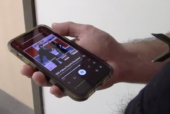UPDATED — In an effort to slow the COVID-19 pandemic, local government leaders in Los Angeles have proposed requiring patrons to show proof of vaccination before entering various businesses and outdoor events.
Starting on Oct. 7, a Los Angeles County public health order will require customers and employees of bars, nightclubs and outdoor events with 10,000 attendees or more to demonstrate evidence of partial inoculation. Patrons who received the Pfizer-BioNTech or Moderna vaccine options, which are delivered in a series of two doses, must show proof of a completed COVID-19 immunization card by Nov. 4. The soon-to-be enacted order will not apply to restaurants with bars.
On Wednesday, the Los Angeles City Council will consider a similar ordinance that would apply to an even longer list of businesses, including restaurants, coffee shops, gyms, spas, salons, stadiums, stores, theaters. If approved, patrons would have to show proof of vaccination in these businesses beginning on Nov. 4.
City council members ordered the city attorney Mike Feuer to draft the ordinance with a unanimous 13-0 vote back in August — but not all 15 councilmembers favor the proposed mandate.
Councilmember John Lee, who represents the northwestern San Fernando Valley, did not attend the August vote, but said in an email that he disagrees with the mandate.
“At a time when we need to move forward together to combat the virus,” Lee wrote, “this measure may only deepen divides without addressing the heart of the matter — getting people vaccinated.”
Lee described the policy as “arbitrary” and “not the way” to combat COVID-19.
The city council’s proposed ordinance would affect more businesses than L.A. County’s announced regulations. Under the city’s ordinance, patrons would be allowed to claim medical, religious or personal belief exemptions, though they’d need to provide proof of a recent negative COVID-19 test to be served indoors.
If a patron doesn’t qualify for an exemption and has no test result, the proposal would allow business to serve the person in an outdoor space, like a patio. Unvaccinated individuals could access indoor areas of the business for “brief and limited periods of time” to use the restroom or pay their bill.
Although L.A. County’s approaching orders exclude restaurants and the city has not yet implemented its proposed policy, many businesses across L.A. have adopted their own policies to require proof of vaccination from visitors at the door.
Santa Monica eatery Birdie G’s is one of them.
General manager Brian Jacobs said the restaurant first carried out an internal vaccination plan for staff but this shortly transitioned into a guest-facing policy.
“It felt like the next necessary step,” he said.
Customers who prefer to present a digital version of their CDC COVID-19 shot record can scan a QR code available in front of the restaurant. The code, provided by the L.A. County Department of Public Health, accesses a government portal with individual archived vaccination information.
Currently, patrons of Birdie G’s who are not fully vaccinated can also dine-in by showing evidence of a negative COVID-19 test result.
Jacobs said that if L.A. County’s vaccination orders expand, he “would be fully supportive” of including proof of a negative COVID-19 test as an option for restaurant goers.
With vaccination mandates in flux and local governments adopting their own set of policies with deferring regulations, it can be difficult for the general public — and especially for business owners who are expected to enforce the rules — to keep up.
Stuart Waldman, president of the Valley Industry and Commerce Association (VICA), said proof-of-vaccination requirements may be effective tools in battling the pandemic. For businesses implementing those requirements, he said the “biggest issue right now is inconsistency” in the details.
Waldman points out that L.A. County will expect individuals to be fully vaccinated when entering bars, but consumers wanting to access outdoor stadiums, which often feature multiple bars, have the choice of presenting a negative COVID-19 test result to gain admission.
Owners and managers of establishments will soon have to decide which crew members will check immunization cards, consider how they store basic employee medical information, and take into account how making time for these undertakings will affect their operation labor hours.
COVID-19 closures have already created financial challenges for countless businesses. Many remain short-staffed.
Waldman emphasizes that small operations that may not have enough personnel will most likely be impacted when enforcing the new regulations.
“To sit there and have to check just makes it more difficult,” he said.
Another factor establishment owners have to take into account is how they will handle employee health or religious exemption requests.
Anthony Zaller, a labor attorney with Zaller Law Group, said that medical exemptions may be relatively straightforward to manage because a doctor can provide physical certification stating when an employee is not eligible to receive a COVID-19 vaccine.
Zaller cautions, however, that exemptions based on “sincerely held” religious or personal beliefs may present complications for proprietors because beliefs are not easily verifiable.
“What if you question the religious belief? Can you question it?” Zaller said. “I urge employers to approach that issue very carefully with the help of an attorney.”
Once vaccine mandates take effect, some business owners will likely have to handle accommodation requests and even consider how to deal with any potentially problematic situations caused by customers who are uncooperative.
L.A. business owners and the general population, alike, may be experiencing fatigue from the wave of regulation changes that has arrived with COVID-19.
For this reason, Christopher Rogers, a health science lecturer at CSUN, recommends that employers keep up-to-date with data from credible government and health organizations.
“They truly have good resources,” Rogers said, “that provide all the latest information on infections and treatments, recommendations, and [which] businesses are or are not going to have specific regulations.”
This story was written and produced by Vanessa Garcia, Kaylenn Gomez, Alahna Martinez and Melody Soto.
This story was updated on Sept. 28 at 2 p.m. to reflect details of the city council’s newly-released draft ordinance.

 Tweet this Video
Tweet this Video Share on Facebook
Share on Facebook Share via E-mail
Share via E-mail

